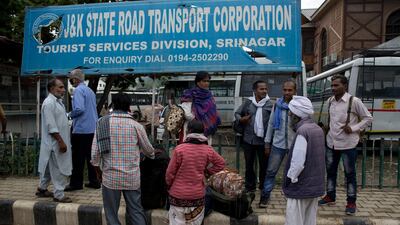Thousands of tourists, pilgrims and students scrambled to get places on planes and buses leaving India's Kashmir region on Saturday after the government said there was a threat of terror attacks.
The exodus came as thousands of troops were being sent to Kashmir to reinforce security in the disputed region where a separatist insurgency has flared up anew in recent years.
The Jammu and Kashmir state government said late on Friday that tourists should leave "immediately" because of new intelligence about "terror threats" to a major Hindu pilgrimage in the region.
The Amarnath Yatra, which draws hundreds of thousands of Hindus each year, was cancelled on Friday, two weeks before it was scheduled to end and despite a huge security force guarding the route to a holy cave in the mountains. A second, smaller pilgrimage in the state's Jammu region, the Machail Mata Yatra, was cancelled Saturday.
Indian security officials said on Friday that they had found evidence of plans by Pakistan-backed militants to attack the Armanath Yatra. They said a mine with Pakistan ordinance markings was among caches of ammunition retrieved following intelligence reports of possible attacks on routes used by pilgrims to reach the holy cave.
"This proves Pakistani attempts to attack the Yatra," said Lieutenant General Kanwal Jeet Singh Dhillon, who heads an estimated 500,000-strong force battling a three-decade insurgency in Kashmir.
India and Pakistan each control parts of Kashmir but claim the territory in full. India accuses Pakistan of training and arming separatist militants, which Pakistan denies. Tensions between the neighbours have been high since a suicide bombing claimed by a Pakistan-based group in February that killed dozens of Indian troops and prompted retaliatory air strikes by India.
The Indian government said earlier in the week that 10,000 extra troops had been sent to Kashmir, but media reports on Friday said a further 25,000 had been ordered there.
Kashmir's police chief, Dilbagh Singh, called the new figure "exaggerated".
Residents and local politicians fear the enhanced security is a preparation for Prime Minister Narendra Modi's Hindu nationalist government to carry out its election promise to scrap special job and property rights for Kashmiris. Political leaders in the territory have warned that cancelling the constitutionally guaranteed rights could spark unrest.
Adding to public distrust in India's only Muslim-majority region, a police order to gather details on every mosque and its leaders was leaked on social media this week.
A top police official, speaking on condition of anonymity, told Reuters that officers had been advised to send their families to safe places and build up food reserves.
Many owners of petrol stations said officials have also asked them to keep vehicle fuel stocks at full capacity.
"It's part of a constantly changing security plan to counter a possible public uprising," the police official said.
The uncertainty prompted Britain and Germany to warn citizens against travelling to the region
"Travellers staying in Kashmir (especially the Kashmir Valley and the Armanath Yatra Pilgrimage Route) are advised to leave Jammu and Kashmir," the German ministry of foreign affairs said.
The UK's foreign office advised against all travel to Jammu and Kashmir, with the exceptions of travel by air to Jammu and within the city, and within the region of Ladakh.
Indian and foreign tourists flooded the airport at the main city, Srinagar, on Saturday, many without tickets for flights that day.
"Passengers who were scheduled to return in coming days have turned up in panic at the airport today," said the manager of one airline operating on the Delhi-Srinagar route.
"It's chaotic and not many will manage seats unless there are additional flights."
Hundreds of Indian students from outside Kashmir left in buses.
"All the non-local students have left the campus for their respective states," an official at the National Institute of Technology in Srinagar told Agence France-Presse.

